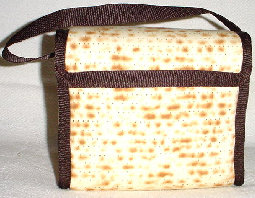 Dear loyal reader and fellow Southerner Pelinke has requested if I might could hook him up with some Pesach-friendly Coca-cola, to which I say, “dude, whaddya think this is, Yenta-Eleven?” (Heheheheh. Please forgive me, I am not well.)
Dear loyal reader and fellow Southerner Pelinke has requested if I might could hook him up with some Pesach-friendly Coca-cola, to which I say, “dude, whaddya think this is, Yenta-Eleven?” (Heheheheh. Please forgive me, I am not well.)
Many of you halachically-minded folks already know that most soda isn’t kosher for Passover, as it contains high fructose corn syrup, which in addition to possibly being one of the greatest dietary evils in history, is manufactured from corn, a no-no for observant Askenazim during Pesach.
Now, being the clueless, winging-it-as-I-go Jew that I am, I started wondering, corn isn’t chametz (defined in Exodus as any of the five particular grains wheat, spelt, barley, oats, and rye,) so why is HFCS a Jewish problem? (It’s certainly an American problem, since it may be making us all fat.)
It turns out corn is included in a whole other food category called kitniyot, deemed unkosher for Pesach by 13th-century sage Rabbi Moshe of Kouchi (also known as “The Smak,” a nickname that conjures up a professional wrestler with a tallis cape and flying peyos capable of shredding any opponent, but I digress.) Kitniyot includes rice, corn, soy beans, string beans, peas, lentils, peanuts, mustard, sesame seeds and poppy seeds, some of which can be made into flour and therefore confused with a food made from the five forbidden grains. So Polish rabbi Moshe Isserlis (known as the “The Ramah,” which sounds like a perfect pet name for a rabbi) banned it all in the 16th century to protect anyone from any possibility of consuming the actual verboten shtuff. As this only applies to the Ashkenazic branch of the family tree, Sephardic Jews have no such blanket ban. (Read more about the differences between Askenazic and Sephardic Pesach rituals here.)
Because I didn’t grow up observing such strict laws (when Passover came, we threw out the bagels for a week, ’nuff said) it’s unlikely that I would incorporate the kitniyot avoidance into my Passover plans anytime soon (I make a mean green bean casserole for seder, yo.) It just seems subjective to me that my kid can’t eat peas because a long time ago a rabbi didn’t trust his flock to figure it out for themselves; I’ve never been so good at accepting “because I said so” as a reason for anything. I struggle with the kosher laws frequently I recently questioned why chicken is considered fleishig and shouldn’t be consumed with dairy, since I’m quite certain that chickens don’t lactate. The answer I got was because the rabbis thought it might be mistaken for meat, so it was lumped into the meat category to protect us from making a bad decision. Rather than inspiring me to become more kosher (I don’t eat piggies and separate milk and meat at home) it made me wonder how much of the observances I feel guilty about not keeping are interpretations (wise be they may) rather than actually handed down directly from Up High. With all due respect to those who do keep kosher (you know I admire you) and the rabbis who wrote the laws, it’s not happening for me on the soul level. Not givin’ up the peanut butter n’ jelly matzah sammiches. Whoever heard of peanut flour anyway? I have a headache.
The point I’m attempting to make is that Kosher-for-Passover Coca-cola is made with actual sugar, not HCFS, and is therefore fine for those on the kitniyot train, but it’s wicked hard to find if you’re not in New York or Israel. But here’s a tip Pelinke: Try shopping at a Mexican market or restaurant for Coke bottled south of the border, where they don’t use the evil corn sweetener. The writing may be Spanish instead of Hebrew, but it’s the real thing.
Me, I don’t drink so much of the Coca, anyway. Unless it’s got a splash or two of rum. Which, being made from sugar cane, appears to be perfectly kosher for Pesach.
 Oh, it’s hawwwwt out, my mishpotech, and I don’t mean like Hugh Jackman in a pair of Levi’s.
Oh, it’s hawwwwt out, my mishpotech, and I don’t mean like Hugh Jackman in a pair of Levi’s. 
 Who can’t wait to schlep matzah to and fro all next week?
Who can’t wait to schlep matzah to and fro all next week?  When I got the email announcing the birth of
When I got the email announcing the birth of  …if I can manage to limp over the the store before sundown. A nice reader asked if I have a good recipe for this Rosh Hashanah delight, which of course I do, just not a whole lotta time to bake it!
…if I can manage to limp over the the store before sundown. A nice reader asked if I have a good recipe for this Rosh Hashanah delight, which of course I do, just not a whole lotta time to bake it! This time of year when someone says “apples,” we start thinking about chopping up piles of ’em with walnuts and cinnamon for a little charoset action, right? (Eeeps, that’s very Ashkenazi-centric of me.
This time of year when someone says “apples,” we start thinking about chopping up piles of ’em with walnuts and cinnamon for a little charoset action, right? (Eeeps, that’s very Ashkenazi-centric of me.  Just when I thought we’d settled all the
Just when I thought we’d settled all the  Dear loyal reader and fellow Southerner Pelinke has requested if I might could hook him up with some Pesach-friendly Coca-cola, to which I say, “dude, whaddya think this is, Yenta-Eleven?” (Heheheheh. Please forgive me, I am not well.)
Dear loyal reader and fellow Southerner Pelinke has requested if I might could hook him up with some Pesach-friendly Coca-cola, to which I say, “dude, whaddya think this is, Yenta-Eleven?” (Heheheheh. Please forgive me, I am not well.) It makes sense that kosher wines are named after famous figures in Jewish history, but I have to admit I never gave much thought to who the men who inspired say, brightly-flavored
It makes sense that kosher wines are named after famous figures in Jewish history, but I have to admit I never gave much thought to who the men who inspired say, brightly-flavored  I whipped up a pretty fabulous Red Lentil Sweet Potato Soup without having to go out to grocery store last night, and I started thinking maybe I was something special. But then this Jewish culinary savant emails me, asking if I’ve seen her blog,
I whipped up a pretty fabulous Red Lentil Sweet Potato Soup without having to go out to grocery store last night, and I started thinking maybe I was something special. But then this Jewish culinary savant emails me, asking if I’ve seen her blog,